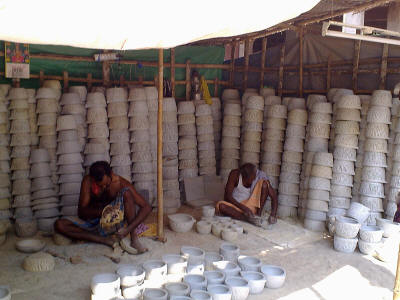Orkkatteri Cattle Fair (Orkkatteri is a small town on the way to Nadapuram from Vadakara in Kozhikode district) is one of the famous trade fair in Malabar, organized in the auspices of historic Shiva-Bhagavathi temple festival.
Its hue and cry is just over. Cattles (bulls) would be either sold or exchanged during the initial days of the festival. (Presently, the number of cattle in the fair is too nominal as the live bulls have been mostly replaced with tillers and tractors to plough the fields.) Other trades get more live after the cattle fair.
Time is now ripe at Orkkatteri for the trade of traditional pots. White, strong pots are made from lime stone in Salem; Tamilnadu. Kilur, Koyilandy, Kuttiyadi, Naduvannur, Perambra, Thalassery and Thaliparamba are other centers in Malabar where the lime stone pots are available for purchase once in a year, during the temple festivals in these places.
Lime stones are extracted in the same method as lateritic stones are quarried in Malabar. Traditional artisans create the stone pots from the rough lime stone. No machine is used to mould the stone into a perfect pot. Hand chisels are being used to carve the stone into beautiful, big and small pots. The price ranges between rupees 150 to 350, depending on size and work involved.
Artisan polishing for perfection.

Housewives and elders would come in group to visit the stalls, selling lime stone pots (Kalchatty). Once in a year, the villagers get a chance to possess the natural, hand-made cooking vessel, since it is unavailable in open market. The old, traditional cooking pot has been accomplishing a big role in the cuisine of almost all rural households.
“It is the best option to keep the traditional quality of vegetarian and meat curries. No modern easy cooking vessel can provide the delicious flavour as this wonderful pot can. Using this innate item is healthier too”-say housewives at the stall in one voice.
(This pot keeps heat for long time than aluminum or steel or any other kind of pots. So chefs in rural households prepare all kind of curries in this pot except fish curries. They prefer earthen pots to cook fish curries as it requires less heat than other non vegetarian items.)
“Even though local populace is well aware of the quality of this natural product; the ratio of sale has not much increased. The traditional cooking method is more strenuous than use of other easy metals. Smokeless chulahs and fuel wood stoves are best for using this pot. Nowadays, people use more of LPG stove, and so they depend on easy cooking wares and pressure cookers to save costly fuel and time.”-says Perumal. He has been a potter since 30 years.
Kalchatti Stall

Although these stalls selling pots starts functioning from the beginning of the festival season, majority of the domestic customers wait for some more days to be free from the crowded town during the peak festival days.
“I have been working in this field for twenty years. We work in Salem for six months in a year and tour the other half for marketing the pots in trade fairs.”- says Rajesh, one of the craftsmen from Salem.
“The handy work has been hereditary. I have completed around forty years, making the pots. The manpower is now in shortage since youngsters are not interested to take up pot making and marketing as a means of livelihood. This trade requires utmost patience and dedication.”-says Shokkalingam.
There are some finishing works for this group in their stalls. They cut and make the edges smooth as the sales progress. Using the powder of the stone mixed with water, they make it more dazzling to draw customer’s attraction. Really, this time honored pot is beautiful.


